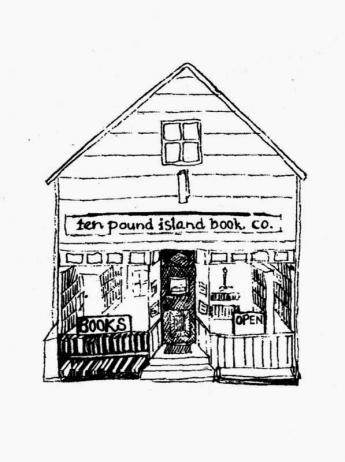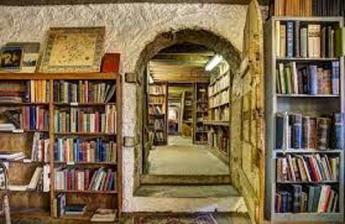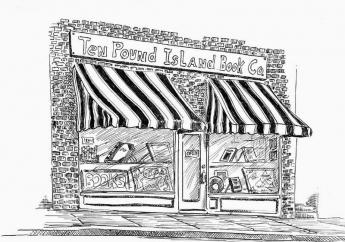Antiquarian Booksellers' Association of America Ten Pound Island Book Company
The Rare Book Trade - Let it Bleed!

By Greg Gibson
Back in the Stone Age, which is where I'm from, if you made your living in the used book trade, you had a shop or you worked in one.
Oh, there were a few people who were smart enough to make their livings as book scouts – selling quality material to dealers and institutions – or organized enough to run mail order search services, which found obscure tomes for customers and quoted books to want ads in places like AB Magazine. Most of us, though, had open shops. These places served as many functions as we owners could contrive - social centers, store rooms, tax writeoffs, financial burdens, places of escape and, of course, the base of operations for whatever book scouting or mail order we might do to supplement our off-the-street incomes.
Shops came in all types and sizes. Back in the days of cheap rent, urban book shops could, and often did, occupy entire buildings. A lot of people in the suburbs operated from their homes, using rooms with street access as retail venues, and many garages found second lives as shops. In the country, all manner of outbuildings were repurposed as "book barns."
Ah, the memory of book barns! The country drive. The cunning old geezer in overalls. The dust covered box in the corner by the milk cans. The rare find. The celebratory picnic in a sunny field outside of East Jesus. The long drive home. The discovery, that night, of the absence of page 135... It was all part of the romance.
Time rolled on, and things changed in their inexorable, execrable way. For any number of reasons - escalating real estate values and the convenience of the Internet chief among them - open shops became less and less practical. Indeed, if you are of a certain age in this trade, you are probably one of those who suffered through the pangs of closing a retail shop.
(I'm on my sixth shop, and have endured the process five times, so I should know what I'm talking about. On the other hand, repeating the same mistake and expecting different results qualifies me as a madman.)
Three things linger after the trauma of closing:
1. The sentimentalists who go on and on about how much they, and the entire community, lament the loss of your shop. Of course if they, and the entire community, put their money where their mouths were or, more aptly, where your store used to be, you wouldn't be closing.
2. The sudden absence of all those tens, twenties, fifties and hundreds that leaked through the door and somehow found themselves in your pocket without stopping at the store ledger first. Goodbye!
3. The books. Oh, my gawd, the books! Where are we going to get books without a storefront for people to bring them to?
I'm afraid I have nothing to say about smarmy book shop funeral followers. And, since I have never, ever, taken unreported cash I don't have any advice on that score, either. But I am here to assure you that, if you have a sincere desire for books – I mean, if you need them – and if you have money in your checking account or cash in your pocket, the books will find you. Books stopped coming through my shop door in any meaningful way in 1993. And yet, despite my best efforts, after all these years, I still have more books than I can sell.
There is one great secret to all of this. Your money and your word must be good. It may sound obvious, but one of the smartest things I've ever done in my career was to be too stupid to defer payments, ask for terms, kite checks, or resort to any of the other dodges that people employ when they feel they are hemorrhaging money. Let it bleed, I say. And the dealers will find you. The scouts will find you. The auction galleries will find you. The downsizing collectors and institutions will find you. The books will find you.
That's how I got where I am today.
Here, for example, is a book that just came in the mail as a result of an unsolicited offer. I have it on my shelves, and now I need to sell it. Perhaps you'd like to buy it.
(Jong, Didrik de). De Walvischvangst, met Veele Byzonderen Daartoe Betrekkelyk.
Amsterdam: Peter Conrad, 1784. 15 copperplates (5 fldg) 6 copper engraved maps. 4 vols, 4to. 96, 116, 116, 116 pp. First edition of this history and analysis of Dutch whaling efforts in the Arctic, including Greenland, Spitsbergen, Novaya Zemlya, Jan Mayen Land, and the waters of the Davis Strait, in the 16th -18th centuries. With charts of these areas as well as a folding chart of "de Noord-Pool," and plates of whales and inhabitants of polar regions. The narrative history is accompanied by statistics of expenditures and catches, and by magnificent plates of whales and whaling activities. The third volume deals with the inhabitants of polar regions, with suitable illustrations, and the fourth volume is a history of the Dutch herring fishery, with a folding panorama of herring fishing. Text in Dutch. This first edition of 1784 is rare, Jenkins citing only the 1791 edition in his bibliography (p. 114) and in his history of whaling (p. 169.) Not in Arctic Bibliography. The whaling plate is cited in Ingalls, "Whaling Prints in the Lothrop Collection". Bound in modern full leather, antique style, with blindstamped covers, raised bands and spine label. Backstip lightly sunned, small oval institution stamp on each title page. A very good copy of a rare and important book in the history of whaling. $4000
***
Posted on Bookman’s Log, presented here by permission of the author. Pictures: Bookman’s Log.



